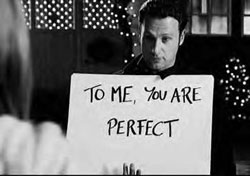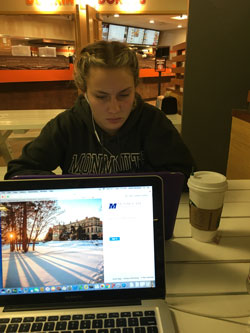You’re at a Starbucks, ordering your mocha-frappa-latte-chino concoction with sweet caramel drizzled on the frothy foam. The man in front of you is yelling to the barista about how he can taste the whole milk in his latte-mcfrapp drink, when he had originally asked for skim. As the arrogant whole milk tasting customer exits the coffee shop, he drops a 20-dollar bill on the floor which you pick up and put in the tip jar. “Karma’s a b***h,” you say to the barista as a smile caresses your face.
This is the moment right before you meet the love of your life. Sounds like the start of a romantic comedy, doesn’t it? If you’re familiar with the movie Monster In-Law featuring Jennifer Lopez you’d know that it’s the scene right before she bumps into the love of her life, Michael Vartan.
Romantic comedies can come in all different shapes and sizes. They can have really complex story lines, like He’s Just Not That Into You, or really traditional ones, like Clueless. Robert Scott, Specialist Professor in the Communication Department has taught a class for an entire semester dedicated to the films that capture our hearts, make us laugh, and inspire us to find true love—a class dedicated to romantic comedies.
“Romantic comedies, my interpretation of them, are anything that’s romantic and has comedic elements, that’s a ‘rom-com’,” said Scott.
It seems simple, but rom-com plots twist and turn to the developing relationships in the movie and need to be taken into consideration. But is dating really as easy as romantic comedies make it seem?
Twenty-somethings’ today are looking for relationships, especially college women. In a study conducted by Lisa Daily, Dating Expert and Author of Stop Getting Dumped, most relationships form after six to eight dates. Yet in the “hook-up culture” of college, going on six to eight dates seems to be a stretch according to Daily’s study.
Emma Johansen, a sophomore business major, believes that the hook-up culture ruined the dating scene in college.
“I don’t think I’ll ever understand how men work, but hook-ups are hook-ups and if a guy wants to date you, he’ll make it known,” said Johansen, “If I went on six to eight dates with a guy here at school, it’d be a miracle.”
So do romantic comedies ring true to today’s society and how the relationship world works? In a rom-com, the formula is pretty simple,
“It’s usually boy meets girl, boy gets the girl, boy messes up, then a love triangle happens, and then guy gets girl back,” says Scott.
Conversely, in Daily’s study she found that the “boy meets girl, boy gets girl” formula is not as laid out as it appears. The boy actually doesn’t get the girl until about 14 dates, whereas her study suggests that men perceive themselves as getting the girl by date three.
A common theme for rom-coms is the casual and yet passionate-filled one-night stands. In the rom-com Love Actually, actress Laura Linny plays Sarah, a working girl trying to take care of her brother who is institutionalized while trying to care for herself at the same time; that also includes trying to get the man of her dreams. With the weight of the world on her shoulders, she falls madly in love with Karl, played by actor Rodrigo Santoro. Daily’s study is opposite of this romantic comedy because Karl and Sarah did not go on any dates before they had a one-night stand.
In a study conducted by Anne Campbell, psychologist at Durham University in England, it is very possible to develop positive feelings from a one-night stand. For men, 80 percent had developed positive feelings after a one-night stand, while for women it was 54 percent.
Ryen Baeza, a junior communication major, is on the fence about developing positive feelings after a one-night stand.
“Usually, I don’t know, guys don’t think about that stuff; sex is just sex,” Baeza said, “I mean, yeah it feels great, which I get having positive feelings for, but those positive feelings definitely aren’t like, relationship feelings; there’s a difference.”
Researchers Robyn Fielder and Michael Carey conducted a study about female hookups in their first semester of college, finding that 60 percent of college students engaged in random hookups by the end of their first semester, none of which resulted in the formation of a long-term relationship.
Another common theme that occurs in romance films is taking the ugly duckling and making her beautiful, thus worthy of winning prince charming. In the teen rom-com, She’s All That starring actress Rachael Leigh Cook and actor Freddie Prinze Jr., it wasn’t until Rachael’s character Laney took off her glasses and patted on a little makeup to then be considered beautiful. According to a study conducted by Chemistry.com, women are approached six minutes more quickly if they have makeup on. Everyone bust out the red lipstick.
Romantic comedies have the habit of transforming youth culture and spinning it to be something of a fantasy. Take for instance the notable scene of Noah Calhoun from The Notebook as he constructs a house from his bare hands, with the sun beating down on his tanned skin, and as sweat drips down his body. Compose yourselves.
Just as much as there are the Noah Calhouns in romance films; it can be hard to be able to pick them out in real life. “Romantic comedies make a bigger deal out of things that don’t normally happen,” said Johansen, “What’s even worse about romantic comedies and reality is that you can’t decipher who’s your prince charming and who’s your villain—because the villain has gorgeous blue eyes, thick brown hair, and a charming smile.”
So why are romantic comedies so prevalent in the lives of college students, specifically college women? With so many over exaggerations why do women follow what they see in the movies?
“In many genres of movies, we are asked to suspend belief—to look at it and say, ‘I don’t care if this happens in real life, this is entertainment,'” said Scott, “We need the distractions from our own lives, that’s why we turn to movies. Everyone wants a bit of rom-com in their lives, and in it’s own way, it works out—but not like it does in the movies.”
For Scott he wants his students to realize that its confidence that is beautiful and not the Hollywood makeup that is shown in the movies.
“You can’t walk into a party and think ‘Why am I not Sandra Bullock?’ said Scott, “College is about self discovery and falling in love with yourself first—don’t rush into things because after all, they are just movies.”
So there you are, turning to exit the coffee shop, with your mocha-frappachino caramel delight in one hand and your car keys in the other. As you turn around to leave, you bump into a guy reaching for a napkin and collide. Your $4.08 coffee spills everywhere, runs down his arm and just barely gets you wet. Your eyes meet his and for a second you’re lost in the depths of his trance, and all you could do is let one breath escape your mouth as you manage to utter, “hi.” Whether it’s a movie or not, you better get some more napkins.
IMAGE TAKEN from hereisthecity.com




